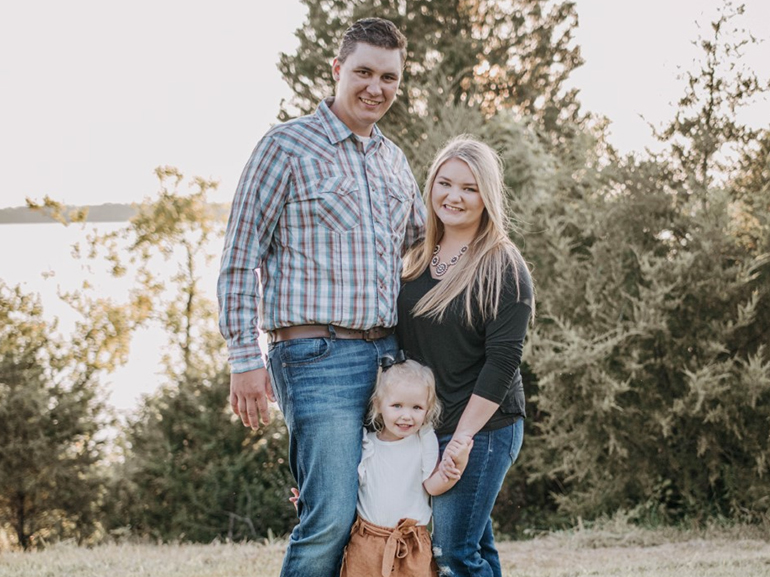Dallas' story

Sabina, Ohio resident Dallas Fyffe, 25, and his wife, Kadence, have a 3 year-old daughter and another child on the way. Dallas works in maintenance at Wilmington Airpark and farms with his father. He loves hunting, fishing and spending time outdoors and with his family.
Quite unexpectedly, Dallas began experiencing pain and numbness in his feet. After a few days, Kadence drove him to the emergency department at their local hospital because he was having a hard time walking and his color was very pale. Diagnosed with a virus, he was sent home to rest. But the pain intensified, so they sought treatment at the Kettering Hospital in Springboro.
After an initial evaluation, Dallas was sent to Kettering’s main campus for further evaluation on his brain. Slowly, Dallas had become paralyzed from the neck down and was still experiencing excruciating pain. Doctors intubated him to assist his breathing, which prevented him from being able to talk. His diagnosis was Guillain-Barre Syndrome, a rare disorder in which the body’s immune system attacks the nerves. Once diagnosed, treatment began with a focus on recovery. Kadence researched the best options to get Dallas back on his feet as quickly as possible. Dallas’ parents, Jerry and Celesa, were also instrumental in the process, visiting TriHealth Rehabilitation Hospital for a tour and meeting the staff.
Dallas wanted an intense therapy program so that he could return home as quickly as possible. When admitted to TriHealth Rehabilitation Hospital, Dallas hadn’t held his daughter in 62 days. He immediately set a goal to walk again so he could get back home to make memories with his wife and daughter.
Upon arrival, Dallas was unable to sit up, get into his wheelchair or feed himself without maximal assistance. His therapy team immediately began to work on getting him up and walking. They focused on exercises to strengthen Dallas’ leg muscles and retrain his brain, which included walking in a LiteGait body weight support system. Dallas recalls this as a turning point as it had been months since he had been able to stand up. Just knowing he was standing and walking again, even with several therapists and aides by his side, was so encouraging.
The support of his family was also instrumental in Dallas’ recovery. Kadence was at the hospital almost every day and she observed his therapy to prepare for his return home. His parents also visited often as did other friends. Dallas’ driving motivation the entire time was to rebuild his strength so he could return home as quickly as possible. He credits the personal connections he built with his therapy team and the staff in helping him achieve that goal.
“My therapists took the time to get to know me, they pushed me to work hard but also supported me and ensured I had the best care. That personal connection had such an impact on me and my family,” Dallas said.
When he discharged from TriHealth Rehabilitation Hospital, Dallas was adept in using a wheelchair and walker for mobility. He also planned to continue rebuilding strength and coordination with outpatient therapy.
Dallas’ advice to others on a recovery journey: “Do your best and stay strong in your faith, even on the difficult days. You can do it!”